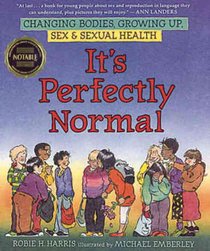 Robie Harris knows more than most people about book banning. Her children’s books on sexual health and family life are perennial standards on challenged and banned lists across the country, accused of being everything from age-inappropriate to “obvious child pornography.” This month, Harris opened up in essay for PEN.org and in an interview with Kirkus Reviews about the emotional roller coaster of book challenges.
Robie Harris knows more than most people about book banning. Her children’s books on sexual health and family life are perennial standards on challenged and banned lists across the country, accused of being everything from age-inappropriate to “obvious child pornography.” This month, Harris opened up in essay for PEN.org and in an interview with Kirkus Reviews about the emotional roller coaster of book challenges.
Harris tells Kirkus contributor Jessa Crispin about the first time her book It’s Perfectly Normal was challenged:
I was totally surprised by how upset I was and for days wondered why I ever wrote a book that was causing a librarian to spend weeks defending it and defending her own professional judgment.
…Children, even our very young children, do not live in bubbles. They live in the real world… How can we hold back writing about powerful feelings, or not include certain information children crave and have the right to know, simply because we are afraid?
It’s Perfectly Normal is an illustrated children’s book that focuses on the development and sexual health of adolescents. It’s pedigree is impressive: The New York Times named it a “Notable Book of the Year,” the San Francisco Chronicle named it one of “The Century’s Best Children’s Books,” and Publishers Weekly and the School Library Journal both named it “Best Book of the Year.”
In writing for PEN.org, Harris describes what makes her fearful about challenges:
I am often asked, “Do these continued challenges make you afraid? Do they make you feel intimidated?” “No,” is my answer, but not my complete answer. In some ways they do make me feel afraid—afraid that kids and teens may not have access to all of the ideas and information to which they have a right, and may need or seek, or come across by happenstance in a bookstore or library. This worries me greatly because of all of the misinformation in the media, on the Internet, and that our kids and teens glean from their peers.
Harris further describes her fear of self-censorship:
My other fear is that I hope that these challenges to my work don’t affect me in a way that would cause me to “self-censor” my work. I hope that I do not even unconsciously avoid a certain word or not write about a subject because of the experience I have had of being a challenged author.
To read the entirety of Harris’s essay, visit PEN.org here. Her interview with Kirkus can be found here.
Books that deal with adolescent sexuality are especially prone to challenge. Fortunately for authors like Harris, who strive to keep challenges from influencing and preventing access to the work they believe in, there are librarians — like James LaRue, whose 2008 response to a parental challenge was reprinted by CBLDF earlier this summer — and organizations like the CBLDF with equal passion and dedication to the availability of information.
Given their visual nature, graphic novels and comic books are among the most-challenged books in libraries and schools. CBLDF is an official sponsor of Banned Books Week, which takes place September 30 – October 6, 2012. Please help support CBLDF’s defense of your right to read by making a donation or becoming a member of the CBLDF!
Joe Izenman is a freelance writer and musician in Tacoma, Washington. He owns a lot of comics and he’s pretty sure someone, somewhere would be offended by more than a few of them.
(With contributions from Betsy Gomez.)